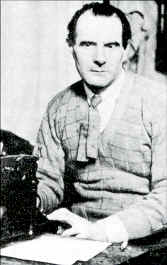The topic of this article may not meet Wikipedia's general notability guideline .(April 2022) |
The Lyric Theatre grew out of Austin Clarke's Dublin Verse Speaking Society. It is no longer operating.
The topic of this article may not meet Wikipedia's general notability guideline .(April 2022) |
The Lyric Theatre grew out of Austin Clarke's Dublin Verse Speaking Society. It is no longer operating.

Abraham Stoker was an Irish author, best known today for his 1897 Gothic horror novel Dracula. During his lifetime, he was better known as the personal assistant of actor Sir Henry Irving and business manager of the Lyceum Theatre, which Irving owned. Before writing Dracula, Stoker worked as a theatre critic for an Irish newspaper and wrote stories. He married Florence Balcombe and had one child with her. Stoker also enjoyed travelling, particularly to Cruden Bay where he set two of his novels. In travelling, Stoker went to the English coastal town of Whitby which, in part, inspired his famous work Dracula. He died on 20 April, 1912 of "Locomotor ataxia 6 months" and was then cremated.

The Abbey Theatre, also known as the National Theatre of Ireland, in Dublin, Ireland, is one of the country's leading cultural institutions. First opening to the public on 27 December 1904, and moved from its original building after a fire in 1951, it has remained active to the present day. The Abbey was the first state-subsidized theatre in the English-speaking world; from 1925 onwards it received an annual subsidy from the Irish Free State. Since July 1966, the Abbey has been located at 26 Lower Abbey Street, Dublin 1.

Micheál Mac Liammóir was an actor, designer, dramatist, writer and impresario in 20th-century Ireland. Though born in London to an English family with no Irish connections, he emigrated to Ireland in early adulthood, changed his name, invented an Irish ancestry, and remained based there for the rest of his life, successfully maintaining a fabricated identity as a native Irishman born in Cork.

Seán O'Casey was an Irish dramatist and memoirist. A committed socialist, he was the first Irish playwright of note to write about the Dublin working classes.

Pat Ingoldsby is an Irish poet and TV presenter. He has hosted children's TV shows, written plays for the stage and for radio, published books of short stories and been a newspaper columnist. Since the mid-1990s, he has withdrawn from the mass media and is most widely known for his collections of poetry, and his selling of them on the streets of Dublin.

Over the centuries, there have been five theatres in Dublin called the Theatre Royal.
The Leinster Hall was a music or concert hall in Dublin, Ireland, built in Hawkins Street on the site of the third Theatre Royal, after the Royal had been destroyed by fire in 1880. The Leinster Hall opened in November 1886. One of the most notable performers to appear there was Dame Nellie Melba, who gave two concerts in the hall in 1893. The hall closed in 1895, and was redesigned and reopened as the fourth Theatre Royal in 1897.
The Capitol Theatre, was located in Prince's Street, just off O'Connell Street, Dublin and began life on 10 August 1920 as the La Scala Theatre and Opera House designed by architect T.F. McNamara it had two balconies in the 1,900 seat auditorium with 32 private boxes. Despite its name, the La Scala was a cinema. Paramount Pictures took over the lease on the building and renamed it the Capitol in 1927. Under new management, the Capitol ran a live show every week to accompany the current film. Well-known Irish acts to appear in these shows included Peggy Dell, Martin Crosbie, brother of Paddy Crosbie, creator of the School Around the Corner, and Sean Mooney. The last stage show was on 29 October 1953. The Capitol continued as a cinema until 1972. It was demolished along with the adjacent Metropole Cinema and a branch of the department store chain British Home Stores was built on the site. This in turn closed and was replaced by a branch of the Irish Penneys chain.

The Tivoli Variety Theatre in Dublin, Ireland, started life as the Conciliation Hall in 1834. Located on Burgh Quay, Dublin 2; It was built as a meeting place for Daniel O'Connell's Repeal Association.
The Mechanics' Hall, also known as the Hibernian Theatre of Varieties, was a theatre and music hall in Lower Abbey Street, Dublin. It stood at the site of the current Abbey Theatre at 26 Lower Abbey Street.

The Queen's Theatre, Dublin, located in Pearse Street was originally built in 1829 as the Adelphi Theatre. This building was demolished in 1844 and rebuilt. It reopened that same year as the Queens Royal Theatre, the new owner having been granted a Royal Patent to operate as a patent theatre. The theatre quickly became known as simply the Queen's.
Events in the year 1907 in Ireland.
Events in the year 1904 in Ireland.
Events in the year 1901 in Ireland.
Events from the year 1821 in Ireland.
Events from the year 1638 in Ireland.

Peter Sheridan is an Irish playwright, screenwriter and director. He lives in Dublin. His awards include the Rooney Prize for Irish Literature. In 1980 he was writer-in-residence in the Abbey Theatre, Dublin, and his short film, The Breakfast, won several European awards. He wrote the pilot episode of Fair City. He wrote and directed the film Borstal Boy, which was released in 2002. He is the brother of the film director Jim Sheridan.

The Olympia Theatre, known for sponsorship and advertising purposes as the 3Olympia Theatre, is a concert hall and theatre venue in Dublin, Ireland, located on Dame Street.
Events from the year 1663 in Ireland.
Thomas Joseph Walsh was an Irish doctor, writer, and founder and director of the Wexford Opera Festival.